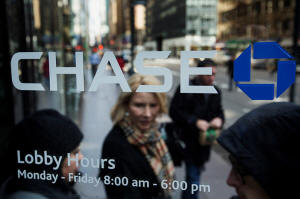US banks' profit picture less clear with cloudy rates trajectory
 Send a link to a friend
Send a link to a friend
 [April 13, 2024] NEW
YORK (Reuters) - The uncertain trajectory of interest rates is making it
hard for U.S. banks to forecast profits and leading some to adopt a
cautious stance for the remainder of the year. [April 13, 2024] NEW
YORK (Reuters) - The uncertain trajectory of interest rates is making it
hard for U.S. banks to forecast profits and leading some to adopt a
cautious stance for the remainder of the year.
Banks have reaped high profits in recent quarters as the Federal Reserve
started raising interest rates in March 2022 to tame inflation, which
boosted net interest income (NII), or the difference between what
lenders earn on loans and pay out for deposits.
But that positive effect has been waning, and the outlook for rates is
now uncertain, particularly after March inflation data came in
higher-than-expected, pushing out Wall Street's forecasts for when the
Fed starts rate cuts.
"It's certainly challenging these days to forecast NII, given all of the
volatility that we've seen across a lot of the different data points, as
well as some of the uncertainty that's out there relative to how our
clients are going to behave," Wells Fargo's finance chief Michael
Santomassimo said.
Wells Fargo's NII fell 8% in the first quarter, hurt by higher interest
rates on funding costs, including the impact of customers moving to
higher yielding deposit products, as well as lower loan balances. The
bank reiterated on Friday that its NII could fall 7% to 9% this year.

"People know interest rates are uncertain but rate changes have a faster
effect on banks than other sectors," said JJ Kinahan, CEO of brokerage
IG North America.
JPMorgan Chase pointed to similar challenges in navigating the changing
rates environment. Chief Financial Officer Jeremy Barnum said on an
analyst call following earnings that while its current guidance was not
meaningfully different from what it was in the fourth quarter, it was
based on the "current yield curve, which is a little bit stale now."
JPM reported that NII rose 11% but it forecast that full-year income
from interest payments would be below analysts' expectations. JPM's
executives have warned for months that its surging NII was not
sustainable.

[to top of second column] |

A customer walks out of a branch of the JPMorgan Chase & Co bank in
New York, March 15, 2013. REUTERS/Lucas Jackson/File Photo

"You've got to be prepared for a range of outcomes, which we are,"
said Jamie Dimon on the analyst call. "All of these questions about
interest rates and yield curves... We don't want to guess the
outcome. I've never seen anyone actually positively predict a big
inflection point in the economy literally in my life or in history."
Teddy Oakes, investment analyst at T. Rowe Price said there was
little benefit to banks of "sticking your neck out early in the
year" and being too optimistic on NII, as higher expectations had
already been priced in.
At Citigroup, net interest income increased 1% year-on-year. The
bank forecast that NII excluding markets would be down modestly, as
growth would be from noninterest-bearing revenue. Citi CFO Mark
Mason said on a conference call that the fewer rate cuts expected
this year don't "have a material impact" on the bank's guidance.
"Notwithstanding a supportive higher-for-longer rate environment,
early indications are that banks will mostly maintain their
relatively downbeat 2024 net interest income guidance," said Mark
Narron, senior director at Fitch Ratings.
Banks were generally positive on the economy, with Dimon saying the
economy remained strong with people having excess money to spend.
"Thereís no doubt the Fedís policy of very high short term rates
impacts banks," said Rick Meckler, partner, Cherry Lane Investments.
"The surprise has always been that the economy hasnít slowed, and so
much of bank earnings are tied to economic conditions.Ē
(Reporting by Saeed Azhar, Noor Zainab Hussain, Manya Saini, Niket
Nishant, Nupur Anand, Sinead Carew, Tatiana Bautzer, Manya Saini;
Writing by Megan Davies; Editing by Nick Zieminski)
[© 2024 Thomson Reuters. All rights
reserved.]
This material may not be published,
broadcast, rewritten or redistributed.
Thompson Reuters is solely responsible for this content. |